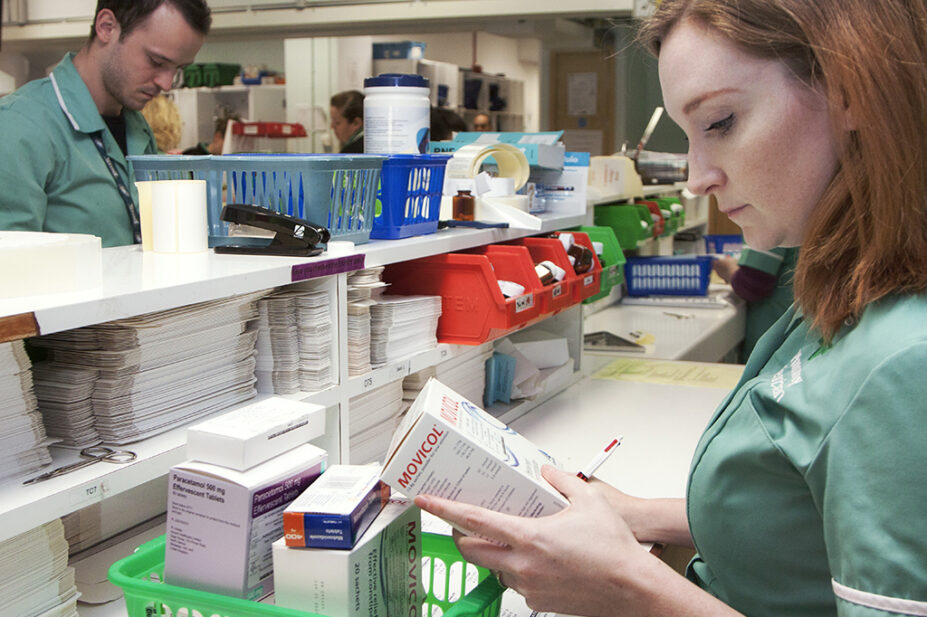
LIFE IN VIEW/SCIENCE PHOTO LIBRARY
NHS England will launch fully-funded training places for 1,000 community pharmacy staff to become educational supervisors for pharmacists and pharmacy technicians from September 2023, it has announced.
Of the training places, 500 are reserved for designated prescribing practitioners (DPP) and 500 will be for other educational supervisors, including designated supervisors.
The announcement, published on 29 August 2023, comes after The Pharmaceutical Journal reported in March 2023 that the NHS had tendered a contract for a provider to train 500 community pharmacists to become DPPs by the end of March 2024.
Delivered by pharmacy workforce training provider ProPharmace and coordinated by the Pharmacy Integration Programme at NHS England, the training is designed to ensure that those involved in educational supervision are confident to support learners within community pharmacy.
“Training will be flexible to accommodate work schedules and will allow learners to develop their skills and knowledge around delivering educational supervision while keeping patient safety and person-centred care at the forefront,” the statement said.
David Webb, chief pharmaceutical officer for England, said the training is “part of NHS England’s strategy to increase access to prescribing supervision in community pharmacy and create a culture where existing pharmacist independent prescribers train to become designated prescribing practitioners and designated supervisors as part of their career development”.
“This is part of our work to ensure the NHS is ready to support and mentor the new workforce of pharmacist independent prescribers from 2026,” he said.
Alastair Buxton, director of NHS services at Community Pharmacy England, said the shortage of DPPs “is one of the key barriers to increasing the number of prescribers”, describing the training as “a welcome development”.
“However, the time of pharmacists acting as DPPs also needs to be funded and this needs to be addressed by NHS England if the sector is going to be able to significantly increase the number of IPs [independent prescribers] able to provide care to patients.”
Pharmacists have warned of a shortage of DPPs, partly because the majority of roles are unpaid, making it difficult to justify taking the position.
However, the demand for DPPs is set to increase, following a push by NHS England to ensure that community pharmacists in the workforce have the option to train as independent prescribers. In February 2023, NHS England announced another 3,000 funded IP training places would be available for pharmacists in England from April 2023, having previously made almost 3,000 places available from September 2022.
A DPP supervises trainee independent prescribers during the hands-on, or ‘experiential learning’, part of their training. Designated supervisors will be able to support training of pharmacy technicians as well as pharmacists.
Liz Fidler, senior professional advisor in pharmacy technician practice at NHS England, said: “I am delighted that this programme will be supporting the expansion of pharmacy technician education supervisors.
“Education supervisors, using their knowledge and skills, will enable us to support and train more pre- and post-registration pharmacy technicians to develop their clinical roles and services, supporting reforms and building in sustainability for the future.”
Tase Oputu, chair of the Royal Pharmaceutical Society’s English Pharmacy Board, said: “We recognise the urgent need to enhance DPP capacity, driving systemic changes across pre- and post-registration stages. The launch of this new NHS training for pharmacy staff marks an important step in expanding the roles of community pharmacists and pharmacy technicians, and will boost patients’ access to services.
However, she added that “there is an absolute need to introduce protected time for pharmacists”.
Noma Al-Ahmad, managing director of ProPharmace, said: “These programmes will provide an innovative approach to developing educational supervisors and designated prescribing practitioners, considering individual learning needs and career aspirations.”


